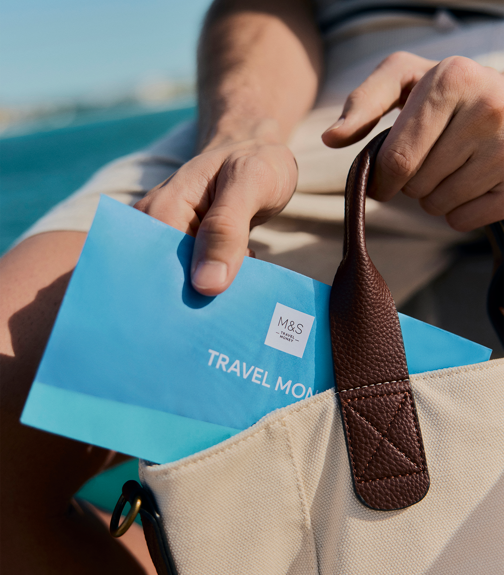How to buy Japanese Yen
-
Buy Japanese Yen Online
Buy Japanese Yen online with Click & Collect at over 580 M&S stores. Use our Pounds to Japanese Yen (GBP to JPY) currency calculator to work out how many Japanese Yen you want. Pick your collection date and collect from your chosen M&S store.
Click & Collect Japanese Yen (JPY) in as little as 60 seconds.*
*Subject to availability
-
Buy Japanese Yen In-store
Buy Japanese Yen in your local participating M&S store.* With over 90 Travel Money Bureaux nationwide - many open seven days a week. - you can buy Japanese Yen at a time that suits you.
*In-store rates may differ from online rates.

Why buy Japanese Yen from M&S Travel Money?
There are so many reasons to choose M&S Travel Money to buy Japanese Yen:
- Our Japanese Yen rate has no hidden fees & zero commission
- Click & Collect Japanese Yen the same day*
- Stores open 7 days a week**
- Get more with Sparks Preferential Rates
**store opening hours vary

What you need to know about the Japanese Yen currency
The Japanese Yen is the official and legal tender of Japan. Its currency code is JPY and its symbol is ¥.
Japanese Yen comes in both coins and banknotes.
Coins include:
¥1, ¥5, ¥10, ¥50, ¥100, ¥500
Banknotes include:
¥1,000, ¥2,000, ¥5,000, ¥10,000 Yen
You can buy Japanese Yen online using our Click & Collect service.
^^Please note not all denominations are available to exchange.

Guide to Japan
An ancient nation with a proud history and rich culture… A strikingly modern country known for anime, quirky trends and daring architecture… A breathtakingly beautiful land of mountains, coastline and cherry blossoms… Japan means something special to all kinds of traveller.
Take a bullet train at 199mph. Experience Tokyo’s nightlife and world-class shopping. Explore Kyoto’s temples and teahouses. Dine on sushi, yakitori and wagashi. Gaze on Mount Fuji and relax in pine forest hot springs… You’ll never tire of all Japan has to offer.
Frequently asked questions
Most urban areas and tourist spots in Japan will accept card payments. However, you should still travel with cash Japanese Yen, especially in more remote areas where card connectivity is less reliable. Don’t forget, you’ll typically face fees, charges and unfavourable rates when making card payments overseas.
Although your daily budget depends on your travel style and preferences, Japan is considered an expensive destination for tourists. For a comfortable travel experience, you could budget around £100 to £200 per day to cover accommodation, meals, and transportation costs. Frugal travellers can spend as little as £45.
Japan’s official currency is Japanese Yen. Other foreign currencies aren’t typically accepted.
If you’re heading to Japan for a holiday, you won’t usually need a visa. UK citizens can stay for up to 90 days, but if you want to stay longer or earn money, you’ll need to apply for a relevant visa and/or work permit.
Your passport must be valid for at least six months from your arrival date. Always check the entry requirements with your country’s embassy before departing.
Tipping isn’t standard in Japan, and can even be considered rude and disrespectful. Excellent service is seen as standard, so if you want to show appreciation, small gifts or souvenirs are welcomed (especially if they’re from your country of origin).
Japanese, also known as Nihongo, is Japan’s primary language, used by the majority of the population. It has several variants depending on where you are in Japan, but the Tokyo dialect is considered standard Japanese.
Ryukyuan languages are spoken in the Ryukyu Islands, including Okinawa. Even though they are from the same language family as Japanese, they are not mutually intelligible. Ainu, spoken by the Ainu people, is an indigenous language that is considered endangered.
Japan is generally considered a safe destination for travellers. However, it’s always wise to check and follow any government travel advisories before your trip.
You can also visit the Foreign, Commonwealth & Development Office (FCDO)for the latest government travel advice for Japan.
Most tourists consider spring the best time of year to visit Japan, with autumn being a close second. During these seasons, the weather is much cooler, and travellers can enjoy Japan’s beautiful natural scenery, including its iconic cherry blossoms. This is also the most expensive time to go, so if you want to avoid crowds and inflated prices, winter offers excellent skiing and snowboarding, as well as the Sapporo Snow Festival.
You should buy your Japanese Yen before travelling to Japan. This way, you could get more out of your travel money budget, as exchanging currency at the airport may result in poor exchange rates.
Japan is the only country where you can use Japanese Yen.
Other popular currencies
If you are planning a future holiday or a trip that take in multiple destinations, these other currencies may be useful:


